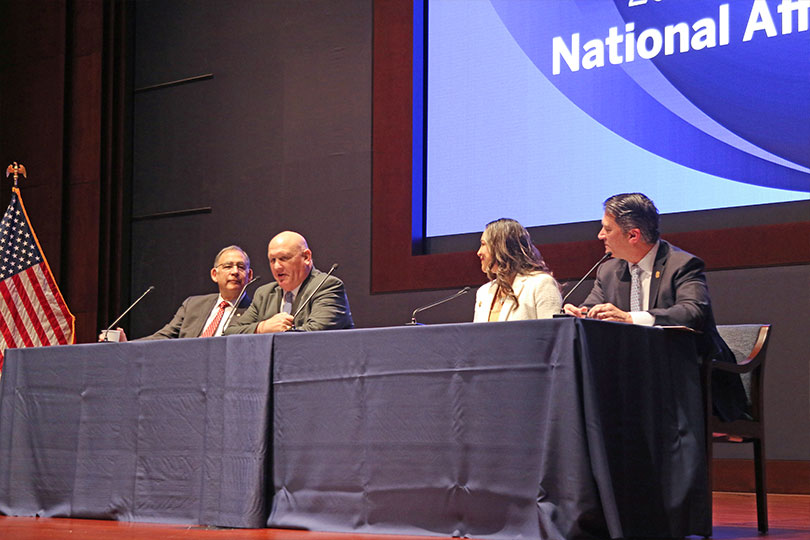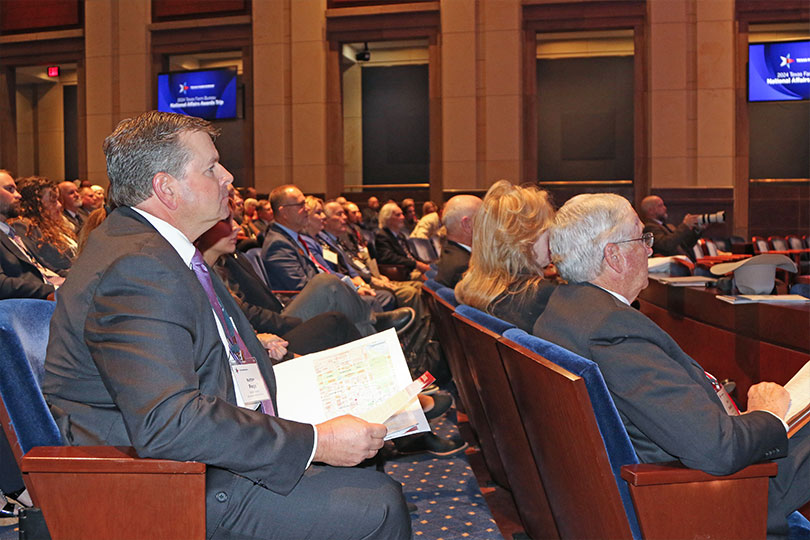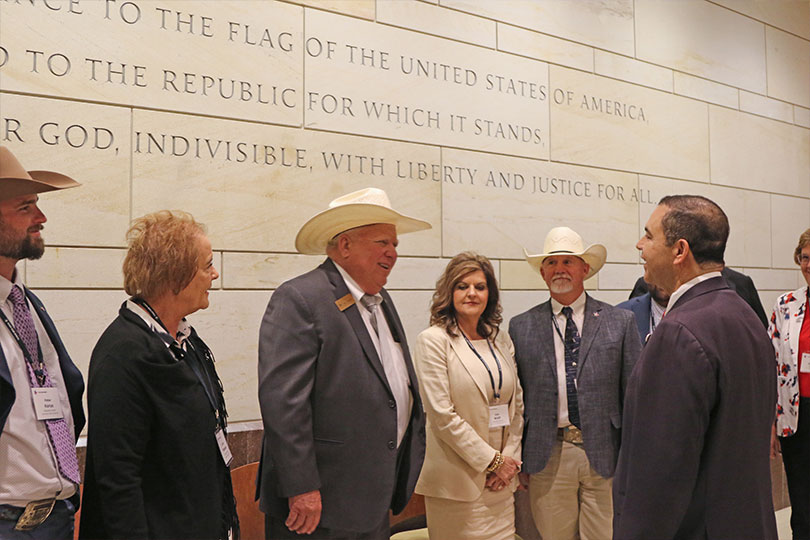By Jessica Domel
Multimedia Reporter
More than 200 Texas farmers, ranchers and landowners traveled to the nation’s capital in mid-April to meet with their lawmakers, advocate for a new farm bill and discuss other issues important to agriculture during Texas Farm Bureau’s (TFB) National Affairs Awards Trip.
The annual trip is an opportunity for TFB members to connect with their representatives in Washington, D.C., and advocate for TFB’s priority issues.
“Where we are really strong as an organization at Texas Farm Bureau is our county leaders and the members,” Laramie Adams, TFB associate director of Government Affairs, said. “If you take constituents who are actually working on their own farms and ranches, and lawmakers hear it first-hand from them, that’s where we make the difference.”
Farm bill
During the trip, TFB members advocated for a full, five-year farm bill with needed increases in the farm safety-net instead of an extension of the current farm bill.
U.S. House Agriculture Committee Chairman Glenn “GT” Thompson told the group he plans to have a farm bill marked up in the committee by Memorial Day.
“As we’ve led Congressional listening sessions, you have helped us to write this farm bill,” Thompson said. “We haven’t released a text yet of the House version—coming soon—but your fingerprints are all over it because the goal was to bring the voices outside of the beltway of Washington to the table, and you’ve done that in a robust way.”
The chairman said they’ve been working on a new farm bill for two years and four months, and while some lawmakers are already showing their support for the food and farm legislation, it will face challenges.
Those challenges include the House firing its speaker, which paralyzes the House for a period of time, and a tight majority.
“Of the 435 members of Congress, over half have never debated or voted on a farm bill before,” Thompson said. “That’s a unique challenge. It requires a lot of education to bring people up to speed.”
The challenges are not insurmountable, though, the chairman said.
“I feel really positive mostly because of the product that we have developed in the House. Listening to your voices, your ideas that you have brought, we heard it loud and clear—the importance of a safety net, and we’re preparing for that in Title 1, but also crop insurance to make sure it’s more affordable,” Thompson said.

Water treaty
Farmers and ranchers from the Rio Grande Valley spoke with lawmakers about the dire need for Mexico to comply with the 1944 Water Treaty.
According to the treaty, Mexico is required to deliver 1.75 million acre-feet of water to the United States over a five-year period.
That water comes from the Rio Grande and flows into Chihuahua state in Mexico where it is held back from reaching the border by several dams.
Through the treaty, Mexico keeps two-thirds of the downstream flows while it is required to deliver the other third to the U.S.
That water is vital to American farmers, ranchers and communities in the Rio Grande Valley.
“We have been devastated by Mexico not giving us the water that we are due. Mexico owes us 700,000 acre-feet of water,” Congresswoman Monica De La Cruz said. “We lost our sugar mill, and that was a loss of 500 jobs. That was a profound economic impact to our area. I’m hearing from our citrus farmers that they’re going to be absolutely devastated and may not survive the next three months.”
De La Cruz and U.S. Sen. Ted Cruz put forward resolutions in the House and Senate asking Mexico to abide by the water treaty.
“We did that with the support of both the chairman, Ronny Jackson and all of the Texas delegation. That was huge,” De La Cruz said. “We’ve worked with the International Boundary and Water Commission and talk to them almost on a biweekly basis. In addition to that, we’ve written multiple letters to the Secretary of State. I’ve met with the U.S. Ambassador to Mexico, the Mexican ambassador to the United States.”
TFB also coordinated a meeting between Rio Grande Valley farmers and the International Boundary and Water Commission, U.S. Department of State, National Security Council, U.S. Department of Agriculture (USDA), U.S. Bureau of Reclamation and White House staff to discuss the ongoing issue.
Trade
U.S. Sen. John Cornyn and House Majority Whip Tom Emmer discussed trade with the group.
Cornyn said the administration has refused to negotiate any new trade agreements.
“They actually don’t have any trade agreements currently in negotiation even though we know that there are many countries that would love to have a free trade agreement with the United States,” Cornyn said. “Of course, what that means is when you just jawbone it and you don’t actually have a trade agreement, then you don’t have the enforcement mechanisms that are required to make the other party live up to their commitments.”
Cornyn said it is disappointing the administration does not seem to believe in free trade agreements that provide the market access and provide enforcement mechanisms that are so important to ag communities.
“Congress must continue to ensure American farmers, ranchers, processors, exporters and consumers—all of us—have access to free trade and new markets,” Emmer said.
In prior hearings with the House and Senate Agriculture Committees, U.S. Secretary of Agriculture Tom Vilsack has said they need Trade Promotion Authority (TPA), or fast track authorization, to get trade agreements through.
“Sometimes there’s a tendency to focus solely on trade agreements and not understand that there’s work below that process that matters. We’ve calculated roughly $20 billion of trade wins that have occurred in the last couple of years,” Vilsack said.
The secretary pointed to potato access in Mexico, an increased beef quota with Japan and India expanding access to apples.
“The reality is we have a much stronger economy than the rest of the world has,” Vilsack said. “When China’s economy suffers, that obviously has an impact and effect on exports. It’s a combination of factors like the strong American dollar. We’re going to continue to work on this, and as far as trade agreements are concerned, the reality is unless you think (Congress) can pass Trade Promotion Authority, it becomes very difficult for us to negotiate a trade agreement out there.”
When implemented, TPA outlines U.S. negotiating objectives and priorities for trade agreements.

Disaster assistance
Cornyn also addressed the 2022 Emergency Relief Program released by USDA.
“When the USDA rolled out this guidance last year, it came as a surprise to just about everyone,” Cornyn said. “I’m told, in essence, a group of bureaucrats decided to adjust relief payments based on a farmers’ gender or color of their skin, which says all you need to know about what their priorities are. What they should be looking at is the impact of natural disasters on the operations of those farmers and ranchers.”
The senator said Congress’ intent was not for ERP to be a social equity program.
“I’ve been pushing the USDA to abandon this unfair methodology, but they seem to be stuck,” Cornyn said. “We need to return to a system where facts matter, where needs-based programs are dispensed based on need.”
Voting
Throughout the trip, lawmakers and aids emphasized to TFB members the importance of reaching out to their representatives and sharing how legislation could impact them.
Kellyanne Conway, political consultant, pollster and senior counselor to former President Donald Trump, said the votes and the voices of farmers, ranchers and rural Texans matter—and can make a difference.
“One person, one vote under the Constitution is the true essence of our democracy in our constitutional republic,” Conway said.
TFB priority issues
Disaster assistance, the farm bill, border security, trade, agricultural labor, the 1944 Water Treaty, rural connectivity, livestock and crop protection and regulatory reform are TFB priority issues for the 118th Congress’ second session.
NAAT was held April 16-19.



Leave A Comment